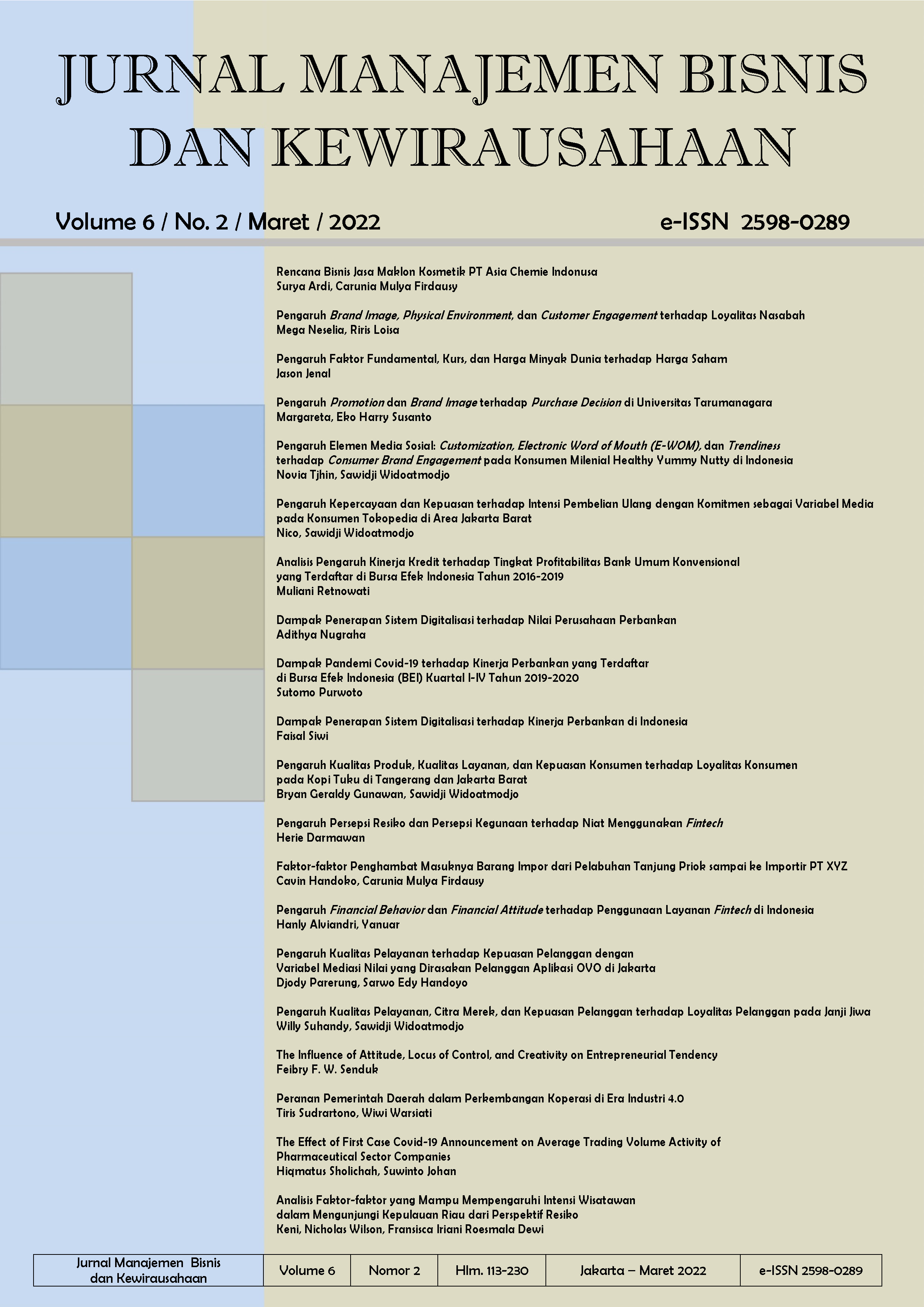Pengaruh Kualitas Produk, Kualitas Layanan, dan Kepuasan Konsumen terhadap Loyalitas Konsumen pada Kopi Tuku di Tangerang dan Jakarta Barat
Main Article Content
Abstract
This study was conducted to determine whether there is a positive and significant effect of Product Quality on Customer Loyalty, second to find out whether there is a positive and significant effect of Service Quality on Customer Loyalty, third to determine whether there is a positive and significant effect of Customer Satisfaction on Customer Loyalty and fourth to determine whether there is a positive and significant effect of Customer Satisfaction on Customer Loyalty. determine whether there is a positive and significant influence between Product Quality, Service Quality, and Customer Satisfaction on Customer Loyalty. The population used in this study were Customers of the Tuku Coffee Shop in Tangerang and West Jakarta. The number of respondents in this study was 200 people, with non-probability sampling techniques and convenience sampling. Data processing was then carried out with the PLS program and tested each hypothesis. The results are: (1) Product Quality has a positive influence on Customer Loyalty (2) Service Quality has a positive influence on Customer Loyalty (3) Customer Satisfaction has a positive influence on Customer Loyalty (4) Product Quality, Service Quality, and Customer Satisfaction have a positive influence on Customer Loyalty. Customer Loyalty.
Penelitian ini dilakukan bertujuan untuk mengetahui apakah ada pengaruh positif dan signifikan Kualitas Produk terhadap Loyalitas Konsumen, kedua untuk mengetahui apakah ada pengaruh positif dan signifikan Kualitas Layanan terhadap Loyalitas Konsumen, ketiga untuk mengetahui apakah ada pengaruh positif dan signifikan Kepuasan Konsumen terhadap Loyalitas Konsumen dan keempat untuk mengetahui apakah ada pengaruh positif dan signifikan antara Kualitas Produk, Kualitas Layanan dan Kepuasan Konsumen terhadap Loyalitas Konsumen. Populasi yang digunakan didalam penelitian ini adalah konsumen dari Kedai Kopi Tuku yang berada di Tangerang dan Jakarta Barat. Jumlah responden dalam penelitian ini sebanyak 200 orang, dengan teknik nonprobability sampling dan convenience sampling. Pengolahan data kemudian dilakukan dengan Program PLS dan melakukan pengujian pada masing-masing hipotesis. Hasilnya ialah: (1) Kualitas Produk memiliki pengaruh positif terhadap Loyalitas Konsumen (2) Kualitas Layanan memiliki pengaruh posisitf terhadap Loyalitas Konsumen (3) Kepuasan Konsumen memiliki pengaruh positif terhadap Loyalitas Konsumen (4) Kualitas Produk, Kualitas Layanan dan Kepuasan Konsumen memiliki pengaruh positif terhadap Loyalitas Konsumen.
Article Details
Section
This work is licensed under a Jurnal Manajemen Bisnis dan Kewirausahaan Creative Commons Attribution-ShareAlike 4.0 International License.
How to Cite
References
Anderson, E. W., & Sullivan, M. W. (1993). The antecedents and consequences of customer satisfaction for firms. Marketing Science, 12(2), 125–143. https://doi.org/10.1287/mksc.12.2.125
Bei, L.-T., & Chiao, Y.-C. (2001). An integrated model for the effects of perceived product, perceived service quality, and perceived price fairness on consumer satisfaction and loyalty. Journal of Consumer Satisfaction, Dissatisfaction & Complaining Behavior, 14, 125–140. https://jcsdcb.com/index.php/JCSDCB/article/view/110
Brady, M. K., & Cronin, J. J. (2001). Some new thoughts on conceptualizing perceived service quality: A hierarchical approach. Journal of Marketing, 65(3), 34–49. https://doi.org/10.1509/jmkg.65.3.34.18334
Etemad-Sajadi, R., & Rizzuto, D. (2013). The antecedents of consumer satisfaction and loyalty in fast food industry: A cross-national comparison between Chinese and Swiss consumers. International Journal of Quality and Reliability Management, 30(7), 780–798. https://doi.org/10.1108/IJQRM-May-2012-0069
Garcia de los Salmones, M. M., Perez, A., & Rodriguez del Bosque, I. (2009). The social role of financial companies as a determinant of consumer behaviour. International Journal of Bank Marketing, 27(6), 467–485. https://doi.org/10.1108/02652320910988339
Hardie, N., & Walsh, P. (1994). Towards a better understanding of quality. International Journal of Quality & Reliability Management, 11(4), 53–63. https://doi.org/10.1108/02656719410057953
Hoffman, K. D., & Bateson, J. E. G. (2016). Service marketing: Concept, strategies & cases (5th ed.). Cengage Learning.
Ishak, A., & Luthfi, Z. (2011). Pengaruh kepuasan dan kepercayaan konsumen terhadap loyalitas: Studi tentang peran mediasi switching costs. Jurnal Siasat Bisnis, 15(1), 55–66. https://doi.org/10.20885/jsb.vol15.iss1.art5
Johnson, M. D., & Fornell, C. (1991). A framework for comparing customer satisfaction across individuals and product categories. Journal of Economic Psychology, 12(2), 267–286. https://doi.org/10.1016/0167-4870(91)90016-M
Khan, M. N., Zain-ul-Aabdean, Salman, M., Nadeem, B., & Rizwan, M. (2016). The impact of product and service quality on brand loyalty: Evidence from quick service restaurants. American Journal of Marketing Research, 2(3), 84–94. http://files.aiscience.org/journal/article/pdf/70210055.pdf
Kotler, P. (2003). Marketing management (11th ed.). Prentice Hall.
Kotler, P., & Keller, K. L. (2012). Manajemen pemasaran (12th ed.). Erlangga.
Kotler, P., & Keller, K. L. (2016). Marketing management (15th ed.). Pearson Education.
Lee, D. Y. (1998). The effects of product quality and service quality on consumer satisfaction and loyalty-A study of gas station. National Cheng Chi University.
Mohammad Haghighi, Dorosti, A., Rahnama, A., & Hoseinpour, A. (2012). Evaluation of factors affecting customer loyalty in the restaurant industry. African Journal of Business Management, 6(14), 5039–5046. https://doi.org/10.5897/ajbm11.2765
Oliver, R. L., & Swan, J. E. (1989). Equity and disconfirmation perceptions as influences on merchant and product satisfaction. Journal of Consumer Research, 16(3), 372. https://doi.org/10.1086/209223
Perreault, J., McCarthy, E. J., & Cannon, J. P. (2013). Basic marketing: A marketing strategy planning approach (19th ed.). McGraw-Hill.
Reich, A. Z., McCleary, K. W., Tepanon, Y., & Weaver, P. A. (2006). The impact of product and service quality on brand loyalty: An exploratory investigation of quick-service restaurants. Journal of Foodservice Business Research, 8(3), 35–53. https://doi.org/10.1300/J369v08n03_04
Santos, J. (2003). E-service quality: A model of virtual service quality dimensions. Managing Service Quality: An International Journal, 13(3), 233–246. https://doi.org/10.1108/09604520310476490
Shaharudin, M. R., Mansor, S. W., Hassan, A. A., Omar, M. W., & Harun, E. H. (2011). The relationship between product quality and purchase intention: The case of Malaysias national motorcycle/scooter manufacturer. African Journal of Business Management, 5(20), 8163–8176. https://doi.org/10.5897/ajbm11.267
Solomon, M. R. (2004). Consumer behavior: Buying, having, and being (6th ed.). Pearson Education.
Zeithaml, V. A., Berry, L. L., & Parasuraman, A. (1996). The behavioral consequences of service quality. Journal of Marketing, 60(2), 31–46. https://doi.org/10.1177/002224299606000203


